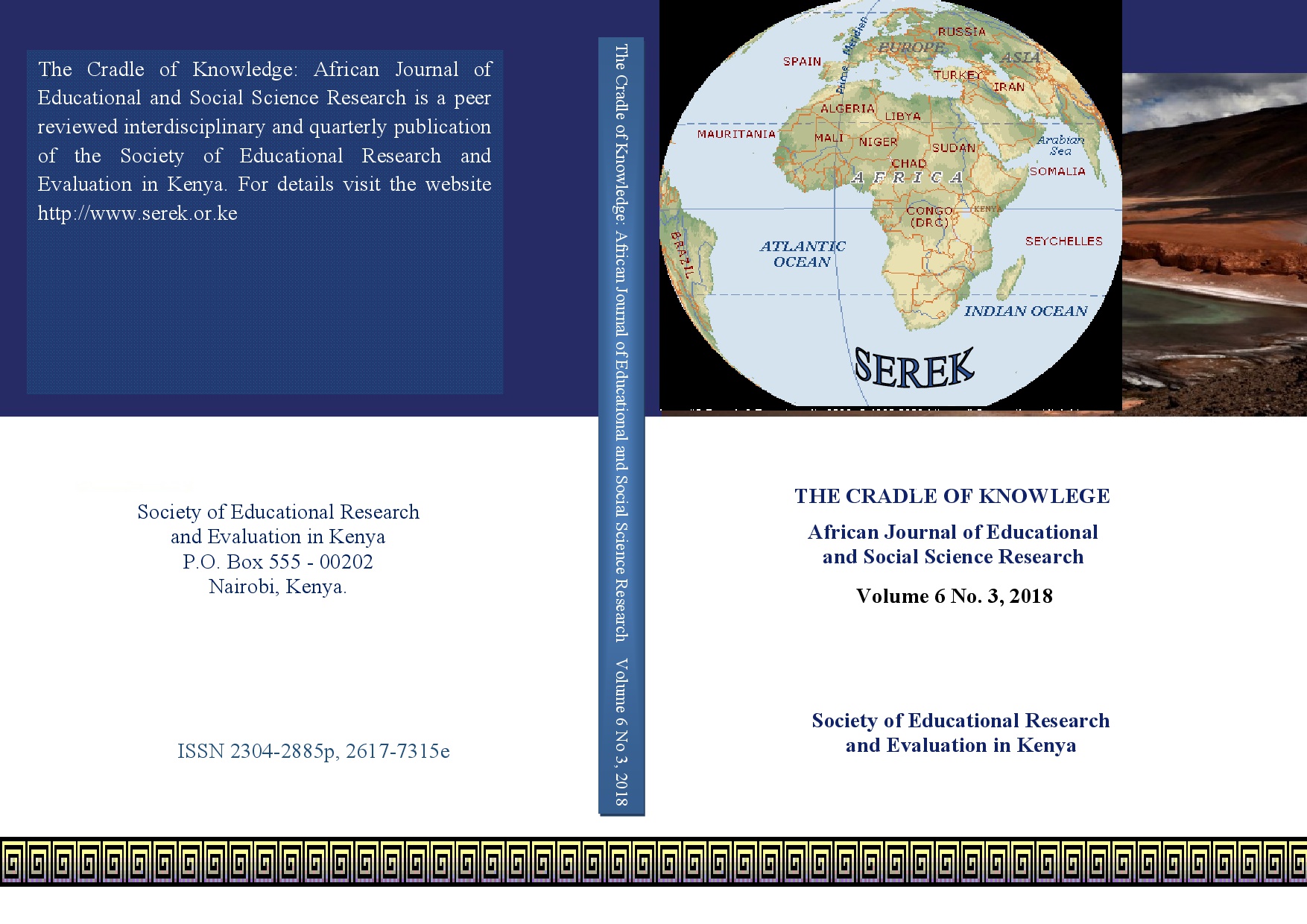
Status of Life Skills Education Teaching and Learning in Secondary Schools in Kibwezi Sub-County of Makueni County, Kenya
Abstract
Full Text:
PDFReferences
Adair J. (2008). On Creative and Innovation. London: Thorogood Publishers. KIE (2008). Secondary Life Skills Education Teachers Handbook. Nairobi: KIE. KIE (2008). Secondary Education Curriculum Life Skills, Education Syllabus. Nairobi KIE. Kiongo P. (2013). Breaking Down Barriers to Classroom Teaching & Leaving Aura Publishers. Nairobi. Kenya Institute of Education. Life Skills Education of http://Wiki Educator. Org/life-skills-education- (Kenya-Institute of Education). Marwang F. & Matheka V. (2015). An Evaluation of Life Skills Education Curriculum Implementation in Kenya Public Secondary Schools. The Case Study of Nyamira District. KU Library http//iv-library.ku.ac.ke/handle/123456/12856. Namwambah T. (2012). Introduction to Critical & Creative thinking. A self-Teaching module. Nairobi: Dariosion Books. Nthango A. (2007). How to Choose and Advance Your Carrer, Personality: Guide to Course and Career. Nairobi: Queenex Holdings. Nisar S. (2012). How to be a Winner in Life. A Self Help Guide to a Successful Life. Nairobi: Salemu Publishers. Republic of Kenya (2017). Basic Education Curriculum Framework. Nairobi: KICD. Rembe, S. (2006). An Assessment of the Policies and Programmes of Zimbabwe in Addressing HIV/AIDS Epidemic in Education sector. Rooth, E. (2005). An Investigation of the Status and Practice of Life Orientation in South African Schools in two Provinces. Unpublished PhD Thesis, University of Western, Cape Town. Sifuna, D. N. (1990). Development of Education in Africa: The Kenyan experience. Nairobi: Initiatives Ltd. UNESCO, (2003). Learning Life Skills together, have we failed? Geneva; UNESCO, International Bureau of Education. UNESCO, (2008). Gender-Responsive Life Skills Based Education. Advocacy Brief, Bangkok. UNICEF (2005). Life Skills Based Education in South Asia. A Regional Overview Prepared for the South Asia. Life Skills Based Forum. Thenandu – Nepal. Format Printing Press. UNICEF (2002). The Participation Rights of Adolescents: A Strategic Approach. Final Consensus Draft, New York. Wachira E. et al (2009). Essential Life Skills Form One Students’ Book. Nairobi: Oxford University Press. Weissberg, R.P., Caplan, M.Z. and Sivo, P.J. (1989). A New Conceptual Framework for Establishing School-Based Social Competence Promotion Programs. Newbury Park, CA: Sage. WHO, (1997). Coming of Age: From Facts to Action for Adolescent Sexual Reproduction Health. Geneva. WHO, (1999). Partners in Life Skills Education: Conclusions from United Nations Inter-Agency Meeting. Geneva. WHO, (1990). Life Skills Education and Guidelines to Facilitate the Development, Implementation of Life Skills Programme. Geneva, / Switzerland: WHO Programme on Mental Health. World Health Education, (1997). Life Skills Education for Children and Adolescents in Schools. Geneva.
Refbacks
- There are currently no refbacks.
License URL: https://www.serek.or.ke
SEREK publication https://serek.or.ke
This work is licensed under a Creative Commons Attribution 4.0 International License